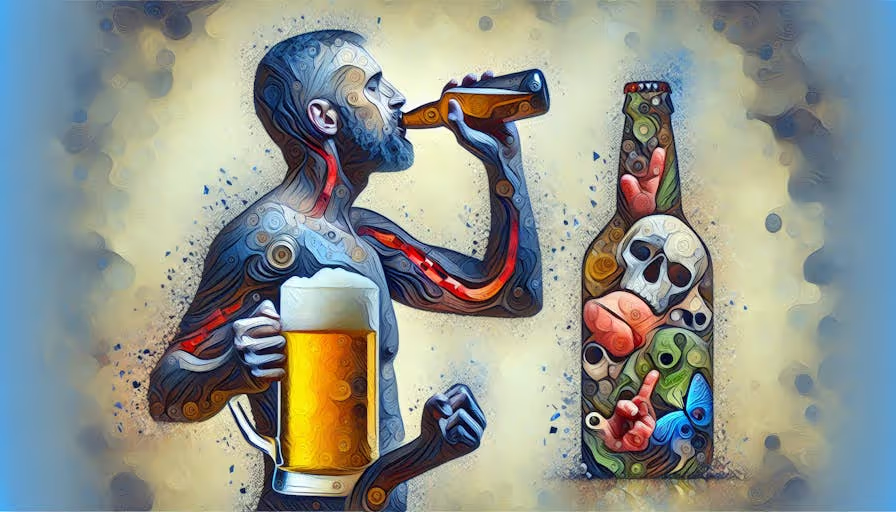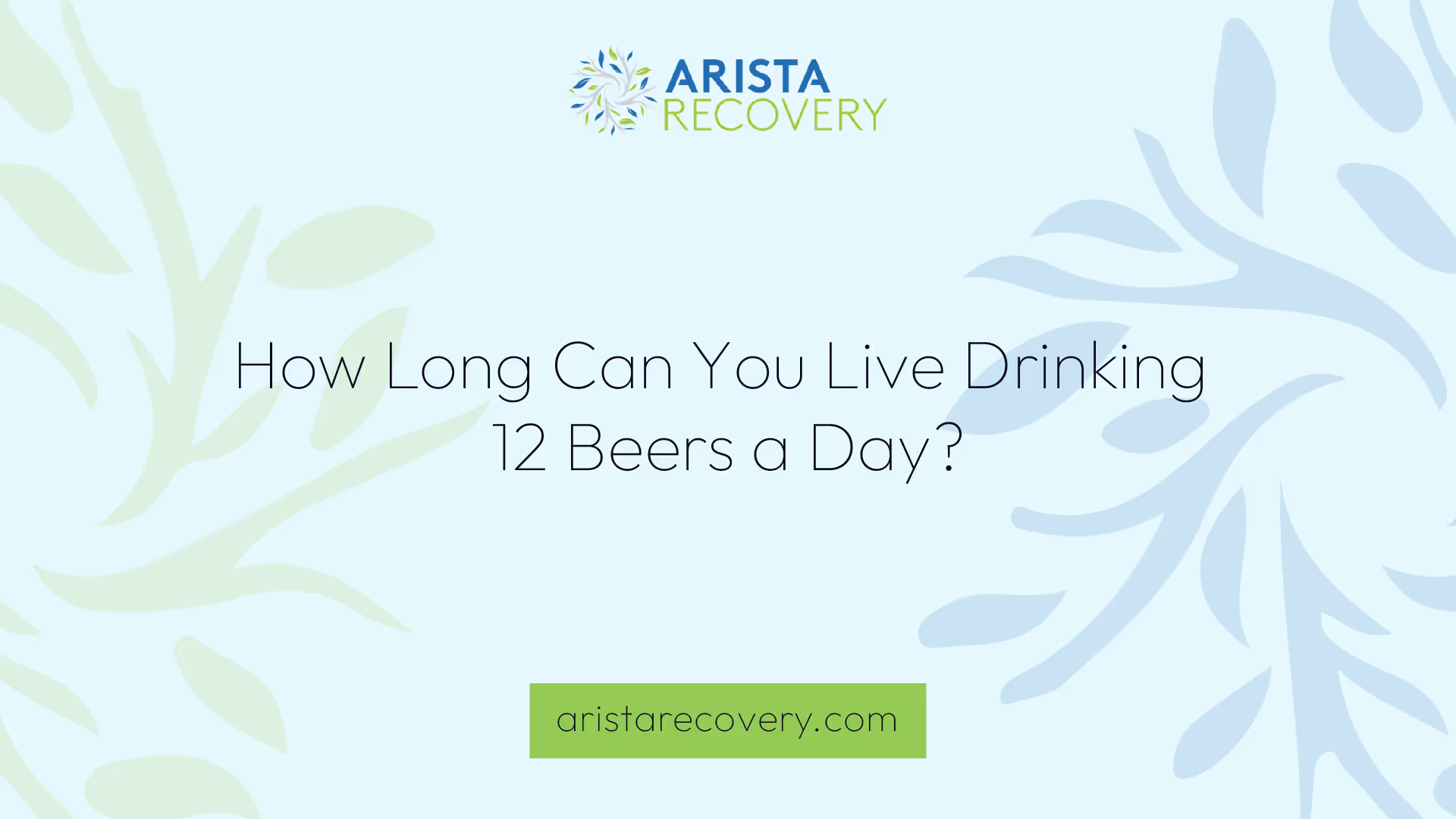How Long Can You Live Drinking 12 Beers a Day?

Understanding Alcohol Consumption
Alcohol consumption, while often associated with social and recreational activities, can have serious health consequences when it becomes excessive. Understanding the distinction between moderate and heavy drinking, and the impact of alcohol on the body, is crucial to address the question: "how long can you live drinking 12 beers a day?"

Defining Moderate and Heavy Drinking
Moderate drinking is typically defined as up to 1 drink per day for women and up to 2 drinks per day for men. Heavy drinking, on the other hand, is generally considered to be more than 3 drinks a day for women and more than 4 drinks a day for men.
Drinking 12 beers a day, then, falls into the category of heavy drinking, and often indicates alcohol dependence or addiction. Regular consumption at this level can lead to a range of health issues, both physical and mental, that can ultimately decrease life expectancy [1].
The Impact of Alcohol on the Body
The impact of alcohol on the body is profound and multifaceted, affecting nearly every organ system. Excessive alcohol consumption can lead to liver damage, heart problems, and an increased risk of certain cancers [1].
In addition to physical health consequences, alcohol can also have negative impacts on mental health, leading to conditions such as depression and anxiety. Furthermore, alcohol abuse can impair judgment and decision-making, potentially leading to risky behaviors and accidents that can shorten life expectancy [1].
Long-term heavy alcohol consumption, such as drinking 12 beers a day, is associated with an increased risk of developing serious conditions like liver cirrhosis, pancreatitis, and cardiovascular diseases. These conditions can significantly impact lifespan and contribute to the findings that heavy drinkers tend to have a shorter life expectancy compared to moderate drinkers or non-drinkers.
In conclusion, understanding the effects of alcohol consumption, particularly at heavy levels, is critical for anyone seeking to make informed decisions about their drinking habits. Recognizing the potential risks and consequences can serve as a powerful motivator for those individuals considering a reduction in their alcohol consumption or seeking help for alcohol dependence.
Health Risks of Consuming 12 Beers Daily
The consumption of 12 beers daily, which is an example of heavy drinking, can lead to a host of health issues. These concerns can be broadly categorized into physical health consequences, mental health consequences, and the risk of addiction and dependence.
Physical Health Consequences
Drinking 12 beers a day can lead to a variety of physical health issues, which can ultimately decrease life expectancy. These include liver damage, heart problems, and an increased risk of certain cancers. Long-term heavy alcohol consumption is also associated with an increased risk of developing serious conditions like liver cirrhosis, pancreatitis, and cardiovascular diseases.
These physical health risks can significantly impair the quality of life and shorten one’s lifespan, emphasizing the gravity of the question: how long can you live drinking 12 beers a day?
Mental Health Consequences
Excessive alcohol consumption, like consuming 12 beers daily, can also have negative impacts on mental health. It can lead to depression and anxiety, and impair judgment and decision-making.
These mental health consequences can further create a vicious cycle of increased alcohol consumption due to an attempt to self-medicate, further exacerbating both the physical and mental health risks.
Additionally, impaired judgment due to heavy drinking can lead to risky behaviors and accidents, which can also potentially shorten life expectancy.
Risk of Addiction and Dependence
Regularly consuming 12 beers a day can lead to addiction and dependence on alcohol. Dependence on alcohol can create a compulsion to drink, leading to increased alcohol intake over time. This could further deteriorate physical and mental health and potentially decrease life expectancy.
Addiction and dependence can also lead to a range of social and economic issues, including job loss, relationship breakdown, and financial troubles, that can further compound the physical and mental health effects of heavy drinking.
In summary, the daily consumption of 12 beers presents severe health risks, both physical and mental, and significantly increases the risk of addiction and dependence. These factors all play a critical role in answering the pressing question of how long someone can live when consuming 12 beers a day. The evidence strongly suggests that such heavy daily drinking is likely to significantly reduce one's lifespan.
The Influence of Alcohol on Life Expectancy
The question of "how long can you live drinking 12 beers a day?" is one that needs to be addressed from various angles, considering both the direct and indirect health risks associated with such heavy drinking.
Direct Health Risks and Life Span
Consuming 12 beers a day can lead to a variety of health issues, which can ultimately decrease life expectancy. Long-term heavy alcohol consumption is associated with an increased risk of developing serious conditions such as liver cirrhosis, pancreatitis, and cardiovascular diseases [1].
Furthermore, regularly consuming 12 beers a day can lead to addiction and dependence on alcohol, which could further deteriorate physical health, adding to the direct health risks that can impact lifespan [1].
Indirect Risks and Life Span
Beyond the direct health impacts, excessive alcohol consumption can also have indirect effects on life expectancy. For instance, alcohol abuse, including drinking 12 beers daily, can impair judgment and decision-making, potentially leading to risky behaviors and accidents that can shorten life expectancy.
Moreover, excessive alcohol consumption, like consuming 12 beers daily, can have negative impacts on mental health, leading to conditions such as depression and anxiety. These mental health conditions not only affect quality of life but can also indirectly contribute to a shortened lifespan.
In conclusion, both direct and indirect health risks associated with heavy daily alcohol consumption significantly impact life expectancy. It's crucial to note that these risks can be mitigated and health can be improved by reducing alcohol consumption and seeking professional help if needed.
Factors Modifying the Impact of Alcohol
The impact of alcohol on an individual's lifespan, particularly in the context of heavy consumption such as drinking 12 beers a day, can be influenced by various factors. These factors include socioeconomic conditions and gender differences. Both play a significant role in determining the effects of alcohol on the body and ultimately, life expectancy.
Role of Socioeconomic Factors
A study conducted in Lancaster County, Pennsylvania, suggests that living in a socioeconomically deprived neighborhood might accelerate the health effects of excessive alcohol consumption. The findings indicate that the adverse effects of heavy drinking are more pronounced in socioeconomically deprived neighborhoods in Lancaster County, Pennsylvania. This suggests that individuals in these areas who consume large amounts of alcohol daily may face a shortened lifespan compared to those in more affluent areas.
This highlights the need for policymakers to focus on addressing socioeconomic disparities to mitigate the negative impacts of excessive alcohol consumption on life expectancy in certain regions. Socioeconomic factors such as employment status, income level, and access to healthcare can all influence how alcohol affects an individual's health and lifespan.
Gender Differences in Alcohol Impact
The impact of alcohol on life expectancy also varies between men and women. Research indicates that the highest probability of reaching 90 years of age was found in those consuming 5-<15 g/d alcohol, with a risk ratio of 1.36 (95% CI, 1.20-1.55) compared to abstainers. The exposure-response relationship was significantly non-linear in women, but not in men. Wine intake was positively associated with longevity, notably in women, while liquor was positively associated with longevity in men and inversely in women. Binge drinking pointed towards an inverse relationship with longevity.
These findings underscore the fact that the type of alcohol consumed, the amount, and the pattern of drinking can have differing effects on men and women. It suggests that gender-specific guidelines may be necessary for alcohol consumption to minimize the risk of shortened lifespan.
Understanding these modifying factors is crucial in the discussion of 'how long can you live drinking 12 beers a day?'. It emphasizes that the answer is not straightforward and depends on a combination of individual and environmental factors. Further, it highlights the importance of recognizing and addressing the broader social determinants of health in mitigating the impact of heavy drinking.
Mitigating the Risks of Heavy Drinking
Understanding the detrimental effects of heavy drinking, it becomes crucial to explore the ways to mitigate these risks. The primary steps include embracing moderation and seeking assistance for alcohol dependence.
Importance of Moderation
The risks and benefits associated with alcohol consumption must be specified in terms of short-term (acute) and long-term (chronic) effects. Acute risks include car crashes, violence, and alcohol poisoning, while long-term risks include chronic diseases such as alcohol dependence, alcoholic cirrhosis, and alcoholic heart muscle disease.
Alcohol's effects cannot be considered in isolation, as moderate drinkers may differ from abstainers and heavy drinkers in other health-related characteristics. Changes in alcohol consumption over the life span can influence associated risks and benefits and alter net outcome.
Alcohol plays a component-risk role in certain cancers, other tumors, neuropsychiatric conditions, and numerous cardiovascular and digestive diseases. Additionally, alcohol has both beneficial and detrimental impacts on diabetes, ischemic stroke, and ischemic heart disease depending on the overall volume of alcohol consumed and the consumption patterns [5].
Thus, moderation in alcohol consumption is of paramount importance. Understanding one's limit and keeping alcohol consumption within the recommended guidelines can significantly reduce the health risks associated with excessive drinking.
Seeking Help for Alcohol Dependence
Alcohol abuse and alcohol dependence are major health problems in the United States, with almost 14 million Americans age 18 and older meeting the criteria for alcohol abuse and dependence in 1992. The alcohol-related costs to the nation have been estimated to include 100,000 deaths and nearly $100 billion each year.
For those who are struggling with alcohol dependence, it's critical to seek professional help. Many resources are available, including rehabilitation centers, support groups, and medical treatments, which can provide the necessary tools and support to help individuals overcome their dependence on alcohol.
It's important to remember that it's never too late to seek help for alcohol dependence. The sooner one seeks help, the better the chances are for recovery and for reducing the life-threatening risks associated with heavy drinking. Making the decision to seek help can be difficult, but it's the first step towards reclaiming control over one's life and health.
Ultimately, the answer to 'how long can you live drinking 12 beers a day?' is contingent upon myriad factors - from genetics to lifestyle choices. However, what's certain is that heavy drinking poses severe risks to one's health and life expectancy. Acting responsibly and seeking help when needed are paramount to mitigating these risks.
References
[1]: https://mpowerwellness.com/12-beers-daily/
[2]: https://www.nature.com/articles/s41598-022-11427-x
[3]: https://www.ncbi.nlm.nih.gov/pmc/articles/PMC7187870/
You’re not alone in this.
When mental health challenges and addiction intersect, it can feel isolating. At Arista, we offer compassionate, evidence-based, and trauma-informed care to help you heal, grow, and move forward.
You’re not alone in this.
When mental health challenges and addiction intersect, it can feel isolating. At Arista, we offer compassionate, evidence-based, and trauma-informed care to help you heal, grow, and move forward.
Support that moves with you.
You’ve taken a brave first step. At Arista Recovery, we’re here to help you continue with best-in-class care designed for long-term healing and support.
.webp)






